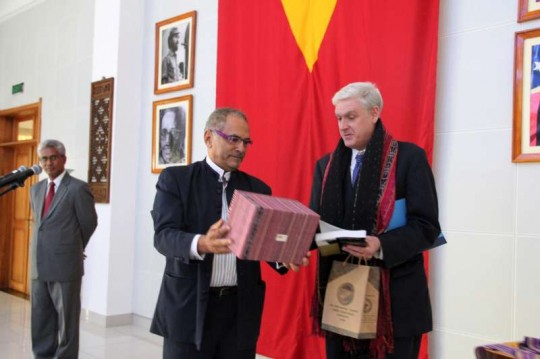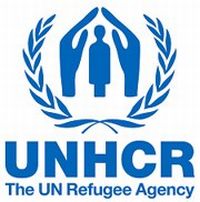Timor-Leste vows never to turn back on refugees as UNHCR office closes
Timor-Leste vows never to turn back on refugees as UNHCR office closes
 José Ramos-Horta, president of Timor-Leste, presents gifts to UNHCR’s James Lynch at a ceremony today marking the closure of the refugee agency’s office in Dili./© UNHCR/K.McKinsey
José Ramos-Horta, president of Timor-Leste, presents gifts to UNHCR’s James Lynch at a ceremony today marking the closure of the refugee agency’s office in Dili./© UNHCR/K.McKinsey
DILI, Timor-Leste, January 12 (UNHCR) – In a ceremony filled with personal reminiscences, Timor Leste’s President José Ramos-Horta on Thursday thanked the UN refugee agency for helping see his young country through the humanitarian crises of its early years.
Ramos-Horta, who convened the gathering at the presidential palace to mark the closure of UNHCR’s Dili office, pledged that his country would never turn its back on refugees because so many of his compatriots were exiles themselves.
“We are always ready to live up to our responsibilities,” he said. “That’s the best way to thank UNHCR and all the countries that all these years have assisted our refugees.”
The president, who spent more than two decades as a refugee in the United States and Australia between 1975 and 1999, said the closure of the UNHCR office after 12 years was actually a sign that Timor-Leste has overcome the humanitarian problems of its early years. “It is great news, positive news,” he said.
UNHCR opened its office here in May 1999, just before the violent August referendum on independence from Indonesia that sent nearly a quarter-of-a-million people fleeing across the island into West Timor. UNHCR later helped 220,000 refugees come home and worked for reconciliation as Timor-Leste moved towards independence. It became the first new country of the 21st Century in May 2002, and the 191st member of the United Nations.
James Lynch, UNHCR’s regional coordinator for Southeast Asia, praised the country’s “impressive achievements,” pointing out that Timor-Leste was one of the few countries in the region to have signed the 1951 UN Refugee Convention. “Even though right now it has almost no refugees or asylum-seekers, it does have national laws in effect to process their claims,” he said at today’s ceremony.
In 2006, during a new emergency, UNHCR rushed aid to 150,000 people displaced within the fragile new country by gang violence, looting and arson.
Both Ramos-Horta and Lynch paid tribute to three UNHCR staff members – Samson Aregahegn, Carlos Caceres and Pero Simundza – murdered in Atambua, West Timor, in September 2000.
“We will always remember the sacrifice they and other UNHCR staff made to help Timorese refugees come home,” Lynch pledged. “I believe the UN refugee agency’s relationship with the people of Timor-Leste was strengthened because of that tragedy.”
With the closure of UNHCR’s Dili office, UNHCR’s regional office in Bangkok will continue to work with the government and civil society to protect refugees and asylum-seekers in the country.
While stressing the warm relations between Timor-Leste and UNHCR, Ramos-Horta told Lynch: “I hope you don’t have to come back here in any more full-fledged emergencies.”
By Kitty McKinsey in Dili, Timor-Leste
###
About the Office of the United Nations High Commissioner for Refugees (UNHCR)

The Office of the United Nations High Commissioner for Refugees was established on December 14, 1950 by the United Nations General Assembly. The agency is mandated to lead and co-ordinate international action to protect refugees and resolve refugee problems worldwide. Its primary purpose is to safeguard the rights and well-being of refugees. It strives to ensure that everyone can exercise the right to seek asylum and find safe refuge in another State, with the option to return home voluntarily, integrate locally or to resettle in a third country. It also has a mandate to help stateless people.
In more than six decades, the agency has helped tens of millions of people restart their lives.
Today, a staff of some 7,685 people in more than 125 countries continues to help some 33.9 million persons.
###
> United Nations (UN).
 The United Nations was established on 24 October 1945 by 51 countries committed to preserving peace through international cooperation and collective security. Today, nearly every nation in the world belongs to the UN: membership totals 192 countries.
The United Nations was established on 24 October 1945 by 51 countries committed to preserving peace through international cooperation and collective security. Today, nearly every nation in the world belongs to the UN: membership totals 192 countries.
When States become Members of the United Nations, they agree to accept the obligations of the UN Charter, an international treaty that sets out basic principles of international relations. According to the Charter, the UN has four purposes:
- to maintain international peace and security;
- to develop friendly relations among nations;
- to cooperate in solving international problems and in promoting respect for human rights;
- and to be a centre for harmonizing the actions of nations.
###
* The above story is adapted from materials provided by United Nations (UN)
** More information at United Nations (UN)




















